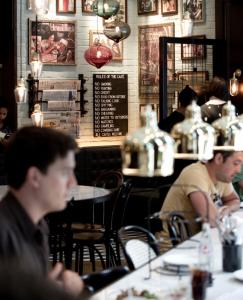 LONDON — Dishoom, which opened last summer and calls itself “A Bombay Cafe in London,’’ takes its name from the Indian comic book equivalent of “Pow!’’ and “Wham!’’ In some Bollywood films, “dishoom’’ is, at times, said out loud in fight scenes when someone throws a punch. Mumbai, once called Bombay, is the home of studios where these films are made.
LONDON — Dishoom, which opened last summer and calls itself “A Bombay Cafe in London,’’ takes its name from the Indian comic book equivalent of “Pow!’’ and “Wham!’’ In some Bollywood films, “dishoom’’ is, at times, said out loud in fight scenes when someone throws a punch. Mumbai, once called Bombay, is the home of studios where these films are made.
Started by three Londoners who spent childhood summers in Mumbai, Dishoom pays homage to old-fashioned spots there. At one point, there were a few hundred cafes in India run by early 20th century Persian immigrants. These establishments, called Irani cafes, are now a dying institution there. With its retro theme, Dishoom attempts to imitate the best of those cafes and distinguish itself from a host of ordinary curry houses in Britain.
The menu draws inspiration from Mumbai’s many earthy establishments that use spices minimally and judiciously. This is in contrast to the princely, spice-rich mughlai cuisine, the mainstay of curry houses, says Shamil Thakrar, an MBA from Harvard Business School, and one of the three owners. Chicken tikka masala, dubbed by some as Britain’s true national dish, comes from this tradition. At Dishoom, grilled masala prawns are made with little more than chilies, ginger, cilantro, and mint. In the Persian-inspired chicken berry biryani, tart cranberries replace the hard-to-find barberries used in the original Iranian meat-and-rice dish. The straightforward pav-bhaji — a potato-based curry with Portuguese bread, onions, and coriander — isn’t as successful. The consistency of the mashed vegetables is runny instead of chunky or pleasantly pasty.
For breakfast, you’ll find novel items such as a bacon naan roll with chili jam, and a satisfying lassi, a fruit-flavored smoothie with oats and a dash of cumin. Lecool.com, a European e-zine, praises the top-notch lassi, perfectly spiced chai, and above all the reasonable prices. The dinner menu’s priciest item is the spicy lamb chops, at about $15. For dessert, there’s chocolate-flavored kulfi on a chopstick and granita-like gola, a Bombay roadside specialty.
The decor evokes the Irani cafes in their heyday, from 1950 to 1980. Accordingly, the background music consists of hits that would have played on the radio then, film songs by Bollywood greats like Asha Bhosle and Mohammed Rafi. Even the non-nostalgic can appreciate the marble-topped tables, the Escheresque floor design, and well-crafted wooden chairs.
“We obsessed over details, and did a tremendous amount of research to re-create the ambience of the cafes, so it is authentic in spirit,’’ says Thakrar. On display are black-and-white photographs of ancestors and period portraits of strangers, bought from Mumbai’s largest flea market. Near the entrance, a board lists legendary Irani cafe rules for customers: “No Smoking, No Fighting, No Credit. . .’’
A laid-back cafe with free Wi-Fi, Dishoom takes reservations for dinner parties of six and more “to avoid queues,’’ says Thakrar.
Thakrar adds that customers are asking the trio if they will open a similar place in India.
Taking this quaint retro-cafe to its original home may be a tricky business venture. But the concept can work in any cosmopolitan city. Think of all the people who could go around saying, “Dishoom!’’
Read the story here.